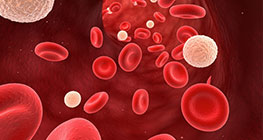

 The Department of Microbiology and Immunology offers a vigorous multi-disciplinary training environment leading to the M.S. degree. Our program focuses on the comprehensive study of bacteriology, virology, and immunology with emphasis on mechanisms of human disease caused by pathogens at the cellular and molecular level.
The Department of Microbiology and Immunology offers a vigorous multi-disciplinary training environment leading to the M.S. degree. Our program focuses on the comprehensive study of bacteriology, virology, and immunology with emphasis on mechanisms of human disease caused by pathogens at the cellular and molecular level.
Graduates with a Master’s degree in Microbiology and Immunology are prepared for research, technical, and supervisory positions in scientific laboratories in academia, industry, government, and the health care field. Within the Master’s program, emphasis may be placed on bacteriology, virology or immunology.
The following areas are available for thesis research: bacterial genetics; influenza virus antigens; HIV infection; pathogenesis of infectious disease; monoclonal antibody production; molecular biology of neoplastic disease; oncogenes and growth factors; anti-idiotype therapy of autoimmune and neoplastic diseases; immunological and biological therapy of disease; and cellular immunology.
The Department of Microbiology and Immunology does not specify prerequisite undergraduate courses, but a background in chemistry (qualitative and quantitative analysis, physical, and organic), physics, mathematics (including calculus), and botany or zoology is desirable.
A minimum of 30 credits and a Master’s Literature Review (Track A) or 32 credits and a Master’s Thesis (Track B) are required for graduation. View the course descriptions here.
The Biomedical Science & Management track (Track C) requires 36 credits overall. This total includes a minimum of 24 credits from the science curriculum, a minimum of 8 credits from the professional skills curriculum, and an internship and capstone project report. A Master’s Literature Review may be substituted for the capstone report if proprietary concerns at the company hosting the internship preclude a formal report. In certain circumstances, with the approval of the program director and associate dean for the professional science Master’s program, a research rotation (MCRM 9800 or BMSM 9800, minimum 3 credits) may be substituted for the internship, along with either a Master’s Literature Review or a Master’s Thesis.
| Track A: | |
| Required Courses | |
| General Biochemistry I (BCHM 1010) | 4 credits |
| Mammalian Physiology I (PHYM 1010) | 4 credits |
| Cell Biology (CBAM 1360) | 3 credits |
| General Microbiology I (MCRM 1010) | 4 credits |
| General Microbiology II (MCRM 1020) | 4 credits |
| Introduction to Virology (MCRM 1050) OR Basic Immunology (MCRM 2010) |
2 credits 2 credits |
| General Biochemistry II (BCHM 1020) OR Biochemistry of Gene Expression (BCHM 1250) |
4 credits 4 credits |
| Molecular Biology and Immunology of Tumor Cells (MCRM 2310) OR Advanced Immunology (MCRM 2020) |
2 credits 2 credits |
| Student Seminar Courses (7101, 7102 series) | 2 credits |
| Master's Literature Review (MCRM 9750) | 0 credits |
| Electives (didactic credits only) | 1-2 credits |
| TOTAL | 30-31 credits |
| Track B: | |
| Required Courses | |
| General Microbiology I (MCRM 1010) | 4 credits |
| General Microbiology II (MCRM 1020) | 4 credits |
| General Biochemistry I (BCHM 1010) | 4 credits |
| Mammalian Physiology I (PHYM 1010) | 4 credits |
| Responsible Conduct of Research (BMSM 2020) | 2 credits |
| Graduate Research Workshop (BMSM 8050) | 1 credit |
| Master’s Thesis Research (MCRM 9800) | 1-5 credits |
| Master's Thesis (MCRM 9850) | 0 credits |
| Electives (didactic credits only) | 8-12 credits |
| TOTAL | 32 credits |
Program Director:
Chandra Shekhar Bakshi, DVM, Ph.D.
Basic Sciences Building - Room 340
shekhar_bakshi@nymc.edu
(914) 594-4814